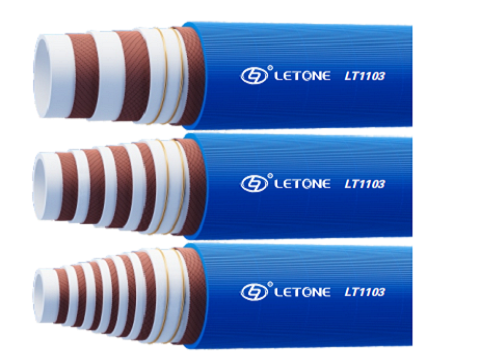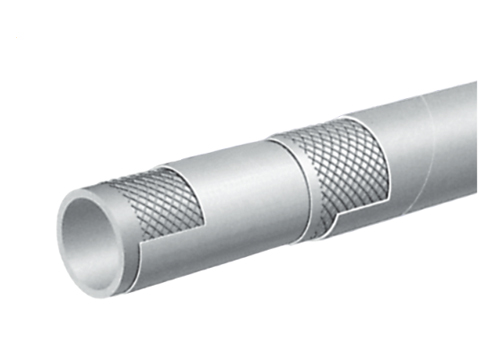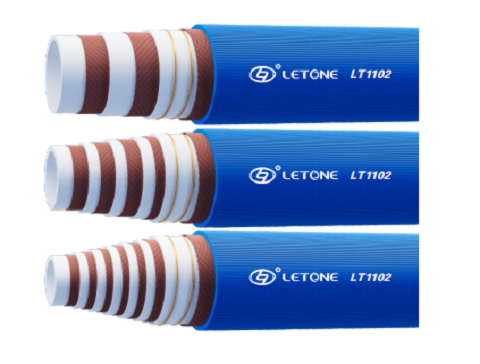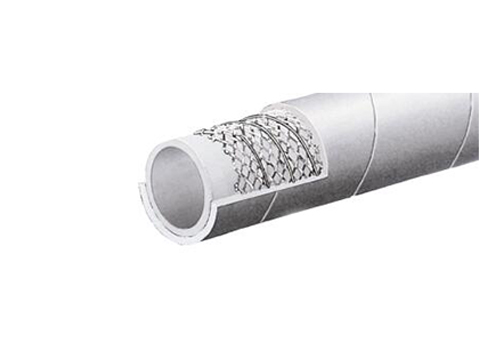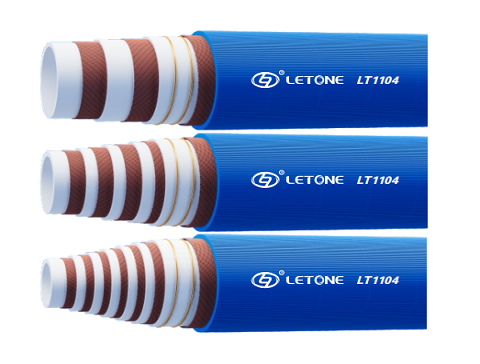Wire wound hose is a high-performance pipeline widely used in various fields. Its core feature is the use of steel wires for tight winding, thereby endowing the hose with excellent pressure resistance, high temperature resistance, and wear resistance. This article will provide a detailed introduction to the characteristics, applications, and advantages of wire wound hoses, helping you better understand this important pipeline material.
1、 Characteristics of wire wound hoses
High strength and pressure resistance: The steel wire wrapped hose is tightly wrapped with high-strength steel wire, which has excellent tensile strength and pressure resistance. It can withstand high pressure and vibration, ensuring the safety and reliability of pipelines.
High temperature resistance: The steel wire wrapped hose is made of high-temperature resistant materials, which can work stably for a long time in high-temperature environments and is not easy to deform or age.
Wear resistance and corrosion resistance: Steel wire wound hoses have excellent wear and corrosion resistance, which can resist the erosion of various chemicals and ensure the long-term use of pipelines.
 Flexibility: Steel wire wound hoses have good flexibility and flexibility, making them easy to install and adapt to various complex working environments.
Long lifespan: Due to its sturdy structure and corrosion resistance, the service life of wire wound hoses is longer, reducing replacement frequency and maintenance costs.
2、 The application of wire wound hoses
Steel wire wound hoses are widely used in fields such as petroleum, chemical, power, food, medicine, etc., as pipelines for transporting gases or liquids. It is mainly applied in the following scenarios:
Petroleum industry: Used for transporting oil, natural gas, etc. during oil extraction, transportation, and processing, it has excellent pressure resistance and corrosion resistance.
Chemical industry: used for transporting corrosive liquids or gases such as acid, alkali, salt, etc., to prevent pipeline corrosion and leakage.
Power industry: used for the transportation of high temperature and high pressure steam and gas, such as the supply of air and exhaust from boilers.
Food industry: used in beverage, dairy, meat processing and other production lines to transport clean liquids and gases.
Pharmaceutical industry: In the fields of pharmaceuticals and biotechnology, it is used to transport drugs, disinfectants, etc., ensuring the hygiene and safety of pipelines.
Other fields: Steel wire wound hoses can also be applied in fields such as shipbuilding, aerospace, and automotive industry.
3、 The advantages of wire wound hoses
Compact structure: The steel wire wound hose adopts a compact structural design, reducing the volume and weight of the pipeline, making it easy to install and use.
High efficiency: Due to its characteristics of pressure resistance, high temperature resistance, and wear resistance, wire wound hoses can ensure the high efficiency and stability of fluid transportation.
Easy maintenance: The maintenance cost of wire wound hoses is relatively low, and they are less prone to leakage and other problems during use, reducing maintenance workload.
Safe and reliable: The steel wire wound hose has reliable safety performance, which can ensure the safety during fluid transportation.
Economy: Although the price of wire wound hoses is relatively high, their long lifespan and easy maintenance make their overall cost lower.
4、 Selection and usage precautions
When selecting and using wire wound hoses, the following points should be noted:
Select appropriate specifications and materials based on actual needs, such as working pressure, medium characteristics, temperature range, etc.
Ensure proper installation, follow the manufacturer's installation guidelines, and avoid twisting, bending, or excessive clamping to prevent damage to the hose.
Regularly inspect the condition of the wire wound hose, and promptly handle any wear or damage found to ensure the sealing and safety of the pipeline.
Pay attention to maintenance and upkeep during use, keep the pipelines clean and dry, and avoid the entry of impurities.
For special application scenarios such as high temperature, high pressure, corrosion, etc., steel wire wound hoses made of special materials with corresponding properties should be selected.
Flexibility: Steel wire wound hoses have good flexibility and flexibility, making them easy to install and adapt to various complex working environments.
Long lifespan: Due to its sturdy structure and corrosion resistance, the service life of wire wound hoses is longer, reducing replacement frequency and maintenance costs.
2、 The application of wire wound hoses
Steel wire wound hoses are widely used in fields such as petroleum, chemical, power, food, medicine, etc., as pipelines for transporting gases or liquids. It is mainly applied in the following scenarios:
Petroleum industry: Used for transporting oil, natural gas, etc. during oil extraction, transportation, and processing, it has excellent pressure resistance and corrosion resistance.
Chemical industry: used for transporting corrosive liquids or gases such as acid, alkali, salt, etc., to prevent pipeline corrosion and leakage.
Power industry: used for the transportation of high temperature and high pressure steam and gas, such as the supply of air and exhaust from boilers.
Food industry: used in beverage, dairy, meat processing and other production lines to transport clean liquids and gases.
Pharmaceutical industry: In the fields of pharmaceuticals and biotechnology, it is used to transport drugs, disinfectants, etc., ensuring the hygiene and safety of pipelines.
Other fields: Steel wire wound hoses can also be applied in fields such as shipbuilding, aerospace, and automotive industry.
3、 The advantages of wire wound hoses
Compact structure: The steel wire wound hose adopts a compact structural design, reducing the volume and weight of the pipeline, making it easy to install and use.
High efficiency: Due to its characteristics of pressure resistance, high temperature resistance, and wear resistance, wire wound hoses can ensure the high efficiency and stability of fluid transportation.
Easy maintenance: The maintenance cost of wire wound hoses is relatively low, and they are less prone to leakage and other problems during use, reducing maintenance workload.
Safe and reliable: The steel wire wound hose has reliable safety performance, which can ensure the safety during fluid transportation.
Economy: Although the price of wire wound hoses is relatively high, their long lifespan and easy maintenance make their overall cost lower.
4、 Selection and usage precautions
When selecting and using wire wound hoses, the following points should be noted:
Select appropriate specifications and materials based on actual needs, such as working pressure, medium characteristics, temperature range, etc.
Ensure proper installation, follow the manufacturer's installation guidelines, and avoid twisting, bending, or excessive clamping to prevent damage to the hose.
Regularly inspect the condition of the wire wound hose, and promptly handle any wear or damage found to ensure the sealing and safety of the pipeline.
Pay attention to maintenance and upkeep during use, keep the pipelines clean and dry, and avoid the entry of impurities.
For special application scenarios such as high temperature, high pressure, corrosion, etc., steel wire wound hoses made of special materials with corresponding properties should be selected.

